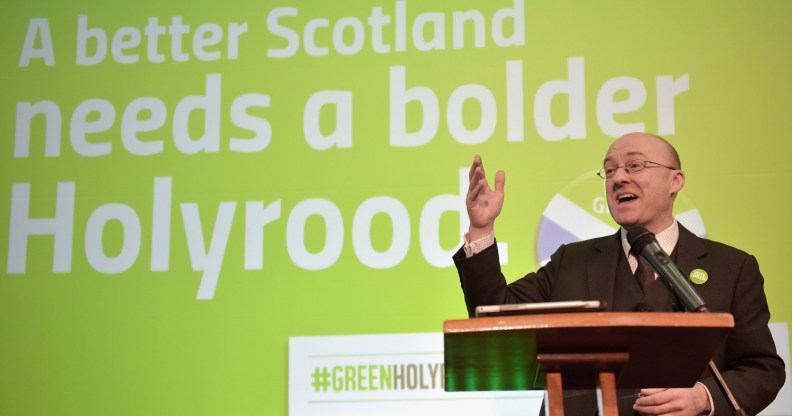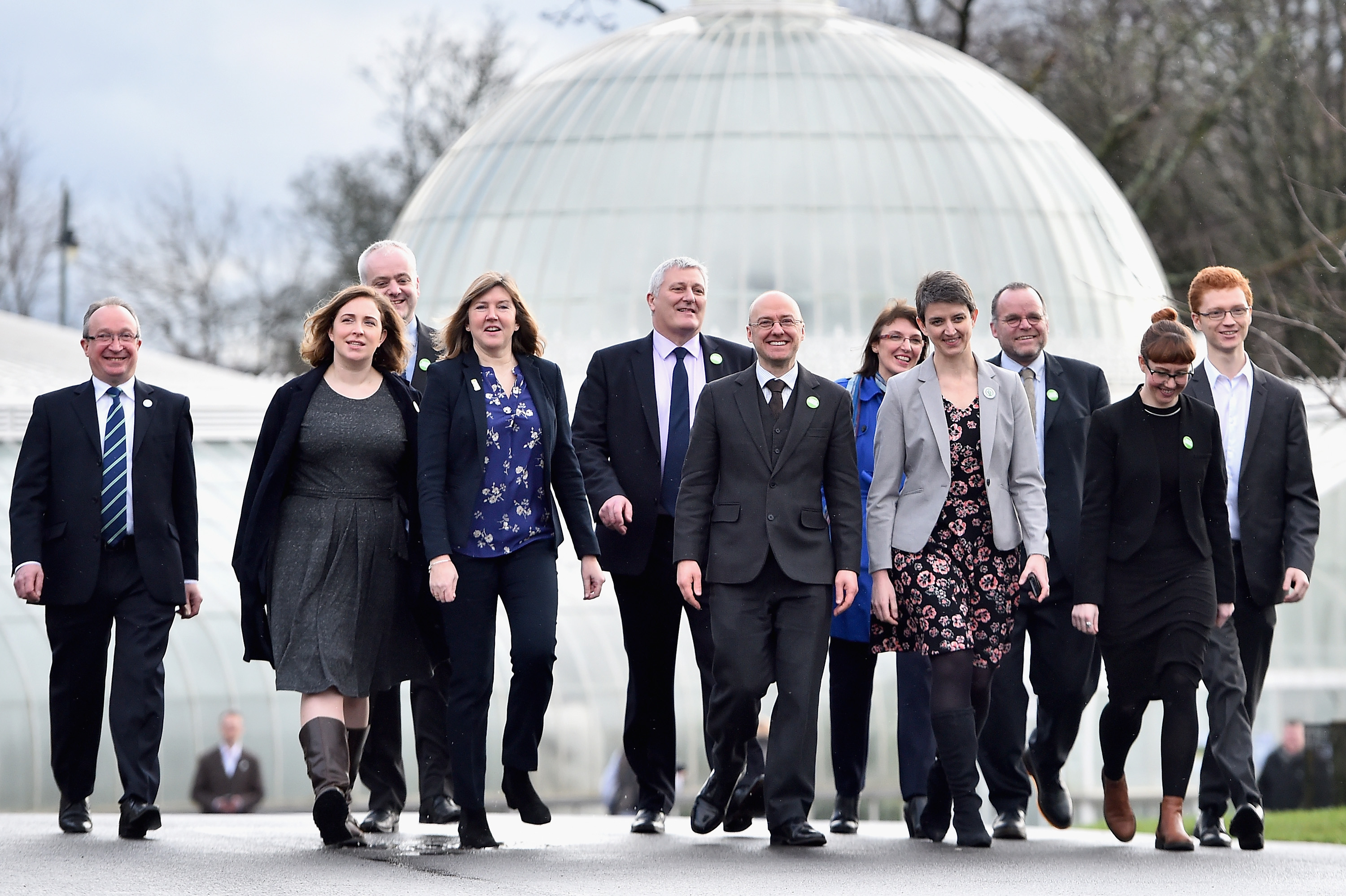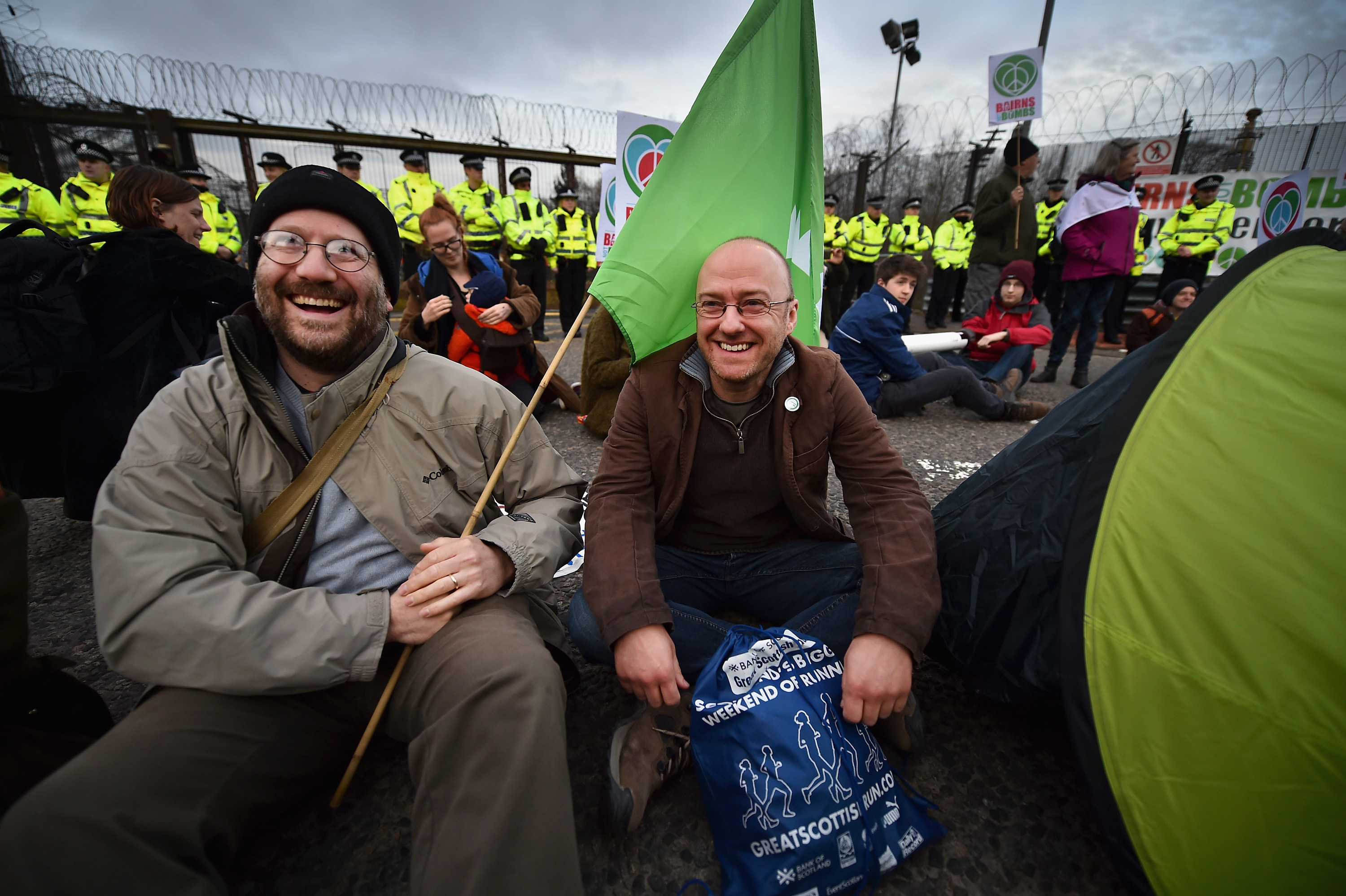Patrick Harvie: Political parties should only select candidates that support LGBT equality

PinkNews Exclusive
Patrick Harvie, co-convenor of the Scottish Greens, has spoken to PinkNews about why political parties need to treat homophobia the same as racism, how politicians can’t duck inclusive education and explains how the Green’s “bizarre” attitude on drugs will tackle Scotland’s problem.
Having represented Glasgow as a list MSP since 2003, this time round he is hoping to dramatically increase the number of Green MSP who sit alongside him – from two in the last parliament.

You are the only party that are planning a major overhaul of income tax. According to your manifesto that could raise an additional £331m for local services. What are your plans with those additional funds and will a share of it go towards education?
First of all our income tax plans go beyond whether you change the basic rate. We talked about splitting it into two, so that someone on an average full time salary won’t pay anymore and anyone on a below average income will be better off. It’s the people at the top end that would pay significantly more.
That’s alongside a replacement for the council tax which would allow council to make decisions on their own circumstances as well as a levy on vacant and derelict land, which is often held back from development by specialist investors. So, looking at those three areas of taxation we can not only prevent the Westminster cuts, but invest in the future and the new high quality lasting industries that need support to grow in Scotland as we see the end of the fossil fuel age coming.
As far as the coming term in the Scottish Parliament, we want to see a 50% increase in the Carer’s Allowance. All political parties are recognising that carers have been undervalued historically in society and we need to change that.
We want adequate workforce planning in both health and education. You talked specifically about education, we think that there is a need for an additional 4,000 teachers over the next five years in Scotland. That can’t be done overnight, so it would take to develop that, but there is certainly a financial commitment that would be applied by that.
Pretty much every part of public services, the whole gammet is under pressure from cuts from Westminster, so we want to protect those services that people depend on.
Well, the reason I picked on education specifically, is because I know that you support inclusive education in schools. How much of this additional money can you see the Greens spending on inclusive education?
I don’t think anyone can put a simple figure on that policy. A lot of it is about using the existing training capacity of the profession but in a different way. We have to incorporate the arguments about equality and the issues that teachers need to understand and come to terms with, to have fully inclusive education.
I don’t think it’s necessary about having some new and standalone approach, but integrating the arguments about LGBTI inclusion right through everything that the teaching profession does.
In many ways much more challenging are the financial impacts and the cultural impacts. There will be some teachers who are resistant to it and there will certainly be issues when it comes to denominational schools. Politicians are going to have to have the nerve to address that head on, instead of simply ducking that issue.
Can you outline for me the Green policy on drugs in regards to legal highs and other substances as well?
The new Psychoactive Substances legislation that’s come from Westminster is completely wrong. It risks repeating all the failures of the authoritarian prohibitionist approach, that’s already failed in other drugs.
We recognise there are a great deal of health risks associated with recreational drug use – that includes alcohol and other legal substances. We have a completely bizarre attitude in this country. Some other European countries are pressing ahead with the decriminalisation approach and we should be discussing that – at least debating it properly.
My view and that of the Green Party is that where problem drug use is causing a health crisis for users, where it’s disrupting their life and having an impact on their ability to live well and healthily, we should be dealing with that as a health issue – not necessarily as a criminal justice one.
Criminalising people in that circumstance doesn’t help people, it doesn’t get them back together again.
Part of the experience of criminalisation of other drugs has meant it leaves the industry in the hands of gangsters, who are not prepared to behave ethically in terms of age limits or the quality of substances – you see contamination and unsafe substances.
if we want to get some control of this then this industry needs to be taken back from the gangster and put into the hands of a regulated set of professionals. We’ll direct folk to services if they need services.
One of the big things that seems to becoming an issue and is probably more of a health one, especially among gay men, is chemsex. It has been rising across the UK. From a health perspective, a lot of people who engage in it won’t see themselves as having a problem. So, how do you deal with it and not make it seems like an attack on gay men?
A great deal of the success, I would say, of gay men’s health initiatives in previous decades has been about leadership and the community taking responsibility, creating new organisations that will lead on these issues rather than have it all directed by health services or health professionals. There has been a relationship over the years that has shifted from the community and public services, but when it has been at its best is when it has been about community leadership.
We need to be learning lessons from how that works in relations to the wider aspects about health – whether that’s drug use or alcohol, which I would still say is a far bigger issue, even though things like chemsex get a lot of coverage.
I think that we need to learn what we can from public health, but as far as the availability of these substances go – so much of this industry has been left in the hands of unethical suppliers including the criminal fraternity. If we want to take control we have to regularise that to some extent.
In your manifesto you talk a lot about putting mental health on the same footing as physical health. The LGBT community, as statistics show, have a bigger prevalence of mental health issues. How can we make mental health services more accessible to LGBT people?
I think that is an issue all political parties have been moving in the same direction. There is a lack of recognition for mental health services and just as we said with education, its not a one size fits all kind of thing.
Different services, whether they are in large urban centres provided by the NHS or small voluntary organisations, which are often better at connecting with people because they are less intimidating.
The first and foremost thing that we need to say is that they are protected from the cuts that are coming. If those cuts are implemented there will be zero chance of trying to develop new initiatives, new approaches and learn from what’s working well and apply that elsewhere.
It simply won’t be happening because people delivering those services will be struggling to do what they do now with a lot less money.
Austerity is a profound threat and not just to people who are currently accessing services, but to anyone with an equality agenda. I think it’s also important to realise that a lot of people delivering these services want to do better and we need to give them the support that they need to build connections and build different sources of expertise. There are issues that the LGBT community could learn from and equally there are things that they could teach.
You are in favour of removing the diagnosing requirement for trans people, yes?
Yes, principally the question of identity should be autonomous. We need to respect people’s right to make a decision rather than jumping through a medicalised model.
Services should not be about determining where someone can move to in their transition or the types of identities they want to have or explore.
There seems to be a cross party consensus already growing on this.
The Sandyford clinic in Glasgow is the only place that really deal with gender identity issues. Great if you are on the Central Belt, but not if you are in the Highlands or Orkney. Do you and the Greens support more centres in other places around the country to make access easier?
I think that everyone acknowledges that is where we want to get to, but you can’t just snap your fingers and get there. The skills and capacity need to be built up. It might mean taking what’s happening in Glasgow and seeing if there can be satellite services offered to other health boards, for instance clinics that can pop up from time to time.
That won’t get everyone what they need on day one, but it would about beginning to spread those expertise and spread the awareness for the need of the service. It will take time, inevitably, these are specialist services and you can’t just magic into being specialised expertise that is needed.
I would say by the end of the current five year term we should closer to having those services available throughout Scotland than we are today.
When I spoke to Nicola Sturgeon, we got a commitment to PrEP and Scotland making its own decision. Do you support a decision on PrEP being made in Scotland?
Absolutely. I have little doubt that the decision will be a Scottish one. There will be a degree of – if I can say tabloid misconception – around the issue and that needs to be challenged. In debates, like things in the past such as emergency contraception, politicians have to make sure they are understood and there is not this tabloid stigmatisation around it because that will make GPs and other services unwilling to provide it.
We need to make sure we are getting that right from day one.
Kezia (Scottish Labour leader) committed to a decision or discussion within the first 100 days of the parliament. Would you support that?
Yeah, I mean people sometimes fixate on what their promise in the first 100 days and that can be a wee bit artificial sometimes. There has been some discussion at a low level about this and I have certainly raised it in cross party groups.
It’s not a new topic and people have began to discuss it and explore it. We’re not at the point of having a decision yet and I don’t know, you would have to ask the Scottish Government, how soon they anticipate making a decision. I think there will be a degree of cross party support and whether that happens on day 100 or 101 doesn’t really matter. It’s about moving it in the right direction.
We need to make sure that when a decision is made, it’s one that is actually going to be implemented in practice.

With hate crime, a lot of people see Scotland as the beckon of LGBT rights and with Kezia just coming out there has been a lot of talk of the gayest parliament. But Equality Network statistics show that the majority of LGBT people still experience homophobia and transphobia abuse. How can we deal with this?
In many ways the high statistics are certainly not to be welcomed, but are positive because people feel more able to report these sorts of crimes. When I was working in the gay men’s project in Glasgow and engaging with the police there was an attitude from some officers that there really wasn’t a big problem.
Far more people are now willing to report these crimes and there is far less tolerance that this is part of normal life. I don’t want to underplay the figures, they are serious, but I would say that we are much more aware of them now. That awareness is a really important first step.
It comes back to education in a way. If we get inclusive education right, it’s not just about doing it because it will make people feel better. It will actually highlight a profoundly long term positive impact on the cultural attitudes and low level prejudice that can ultimately feed in to harassment, bullying and even hate crime.
Should police officers training include dealing with LGBT issues?
Absolutely.
We’re at the tipping point now, where this might be the first generation there is no serving officers left who were trained when homosexuality was illegal. The older officers will be retired. It does take a long time for a culture, especially in an institution like the police, to acknowledge and change in the way that society does.
Let’s work with the grain of what’s happening there and make sure that the police are accessing the service that they need to.
Was there anything else you wanted to say?
The only other thing really is the acceptability of candidates who oppose our community’s equality. I would like us to get to the point and I know it’s not going to happen in this election, but I would like us to have all parties treating homophobia, transphobia and biphobia as seriously as they treat racism or misogyny.
With the except of the far right, UKIP and BNP, a party would kick a candidate out for expressing racist views. The same approach is taken for sexual violence. We should have the situation where LGBTI people are treated the same and it’s not seen as a special conscience matter, where if you want to treat same-sex couples differently under the law that’s okay.
We need to recognise that this is not a special conscience issue anymore than racism or sexism is not. This is a matter where all political parties need to be accepting equality.

PinkNews’ Scottish election coverage is sponsored by the Royal Bank of Scotland.
Elections take place to the Scottish Parliament on May 5.

